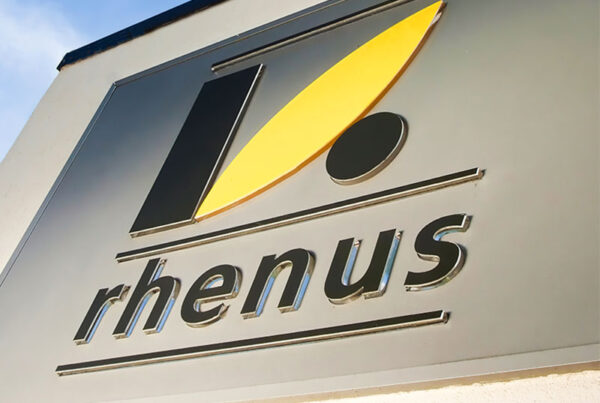New product launch at KSS trade fair: Rhenus Lub introduces new coolant without formaldehyde depots
Reading time: 7 Min. | 02.05.2017
Content
With the innovative coolant rhenus FU 800, Rhenus Lub showcased a fluid that is free from amines, boric acid and formaldehyde depots at the KSS trade fair in Stuttgart from 5 to 7 May 2015. The new product already meets the strictest health and safety requirements and there is no need for labelling.
With the innovative composition of rhenus FU 800, manufacturer Rhenus Lub is embracing a simple principle: The best approach is to avoid any ingredients that are potentially hazardous. Disagreement has prevailed for some time between scientists and manufacturers concerning ingredients and thresholds. For researchers and lawmakers at national and European level, thresholds are liable to change. Substances regarded as harmless today may be categorised as posing a risk to health tomorrow. When lawmakers tighten up legislation, this is often based on more precise measuring techniques or new scientific findings. Users can therefore play it safe if they avoid ingredients from the outset that may be legislated against sometime in the future.
“What’s not in the product can’t harm you!”
Users and manufacturers are therefore following a principle that makes perfect sense: Substances that are absent from the fluids cannot cause skin irritation, health hazards or any other harm.
Although responsibility for protecting workers always lies with the employer, Rhenus Lub believes it begins with the manufacture of coolants. “We see health and safety today as a preventative measure that we offer our customers, namely users in the metal machining industry”, says Dr. Hans-Jürgen Schlindwein, Head of Coolant Research & Development at Rhenus Lub.
Compliance with health and safety standards and environmental responsibility are therefore firmly rooted in the company, and are ensured by means of quality management and health and safety management systems such as ISO 9001, 14001 and OHSAS 18001. “We use these standards to formulate our coolants”, explains Dr. Schlindwein. “In formulating rhenus FU 800 we have consistently avoided all ingredients that are the subject of intense debate at the moment. Our new fluid is therefore the prime example of a modern coolant, combining all beneficial properties into one — it is safe, performs well and has no labelling requirements, making it future-proof for the machining sector”.
Future-proof as a result of innovative composition
In formulating rhenus FU 800, researchers at Rhenus Lub, the lubricant specialist based in Mönchengladbach, are breaking new ground, consistently avoiding amine and boric acid-based additives and also a formaldehyde depot. In addition, a new emulsifier system has also been developed especially for rhenus FU 800, which foams less and has good flushing properties.
Why exclude amine and boric acid-based ingredients? For 25 years, Dr. Hans Jürgen Schlindwein has been a pioneer in the development of environmentally-friendly fluids with outstanding health and safety properties that are not harmful to humans: “The consistent amine-free composition of coolants prevents the build-up of dangerous nitrosamines. Any build-up of carcinogenic compounds from impurities that may be present in the amines is also ruled out in the absence of amines”.
Alongside the amine-free composition, the exclusion of boric acid was also an important step for the research and development team at Rhenus Lub in developing cutting-edge lubricants that are environmentally-friendly. This is because, under the latest EU legislation, boric acid is suspected of being toxic for reproduction and therefore damaging to the human genome. “As a specialist manufacturer of coolants, we therefore face a particular challenge”, says Dr. Schlindwein. “Boric acid, bonded as boric acid alkanol-amine ester, has long been a key ingredient in the manufacture of high-performance water-miscible coolants”.
Furthermore, the exclusion of the formaldehyde depot is also an example of approaching coolants in a sustainable and responsible manner. Using formaldehyde depots in the coolant prevents the growth of bacteria. Formaldehyde, the main component in the formaldehyde depots, is categorised as a 1B carcinogen. There is therefore the risk that formaldehyde depots will be given a similar categorisation. “But it’s possible to do without it”, emphasises Dr. Hans Jürgen Schlindwein. “Without there being a statutory requirement to do so — and far surpassing the health and safety standards for users — we have found a way to replace these substances with innovative compositions and ingredients. And have done so without raising the pH value”.
What users want is a coolant without labelling requirements
This consistent selection of ingredients means that there are no labelling requirements for rhenus FU 800. This brings a clear benefit to users in the metal machining industry, since labelling requirements can cause serious difficulties for them.
Since 1 June 2015, preparations, including coolants, have to be categorised under the GHS/CLP Regulation (Globally Harmonised System, Regulation on Classification, Labelling and Packaging of Substances and Mixtures). The aim of the globally harmonised system is to standardise the protection of human health and the environment, making it more transparent and comparable.
Where there are no labelling requirements, workers feel reassured and companies benefit from a number of concrete operational advantages. If labelling is required, this must be provided and monitored, requiring workers to be trained for the relevant level of hazard. Plant and machinery also has to be modified in some circumstances, at considerable cost.
Dr. Hans Jürgen Schlindwein is convinced that “it only makes sense for users to work with coolants that have no labelling requirements and pH values that are very kind to skin, particularly in the case of amine-free coolants”.
High performance — contrary to misconceptions
Many users still believe that for a coolant to perform well, it must have added amines and boric acid. rhenus FU 800 puts this misconception to rest once and for all. In a range of practical tests, the innovative coolant has proven that it performs at least as well as amine and boric acid-based fluids.
Testing has also demonstrated that rhenus FU 800 can be universally used in demanding machining applications, for example in the aviation industry, where many workpieces have to be milled from a single solid piece of material, ranging from grey cast iron to aluminium through to titanium. In extensive testing conducted at 14 customers on 18 machines, the new coolant has yet to reach the limits of its performance.
Keywords











